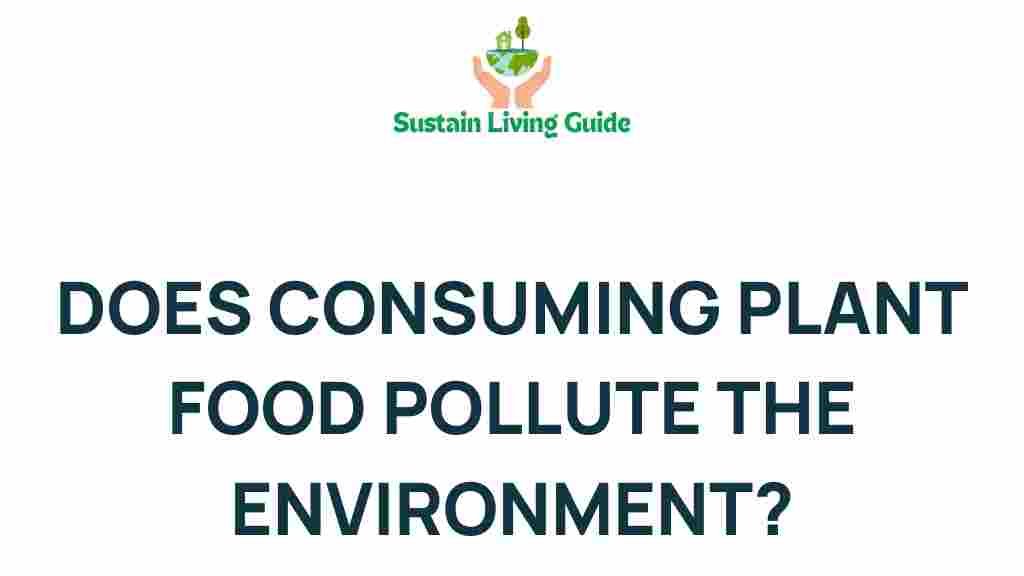The Environmental Impact of Plant-Based Diets: Myth or Reality?
In recent years, the popularity of plant-based diets has surged, driven by health trends, ethical concerns about animal welfare, and a growing awareness of environmental issues. As more people consider making the shift towards a plant-based lifestyle, questions arise regarding the actual environmental impact of these diets. Are they truly beneficial for the planet, or is the narrative surrounding them exaggerated? This article aims to explore the reality behind plant-based diets and their environmental implications.
Understanding Plant-Based Diets
A plant-based diet primarily consists of foods derived from plants, including fruits, vegetables, nuts, seeds, and whole grains. While some may still include small amounts of animal products, the focus remains on maximizing plant consumption. This dietary approach is often associated with lower greenhouse gas emissions, reduced water usage, and less deforestation compared to traditional meat-heavy diets.
The Environmental Benefits of Plant-Based Diets
Numerous studies have highlighted the environmental benefits of adopting plant-based diets. Here are some key areas where plant-based diets can impact the environment positively:
- Reduced Greenhouse Gas Emissions: Livestock farming is a significant contributor to greenhouse gas emissions. According to a study published in the journal Nature, plant-based diets can lead to a reduction in emissions by up to 70%.
- Lower Water Usage: The water footprint of producing plant-based foods is considerably smaller than that of animal products. For instance, producing 1 kg of beef requires about 15,000 liters of water, while 1 kg of vegetables requires only about 300 liters.
- Conservation of Land: Animal agriculture requires significant land for grazing and growing animal feed. Transitioning to plant-based diets can help reduce the need for vast tracts of land, thereby conserving natural habitats and biodiversity.
- Reduction in Pollution: Animal farming generates manure and other pollutants that can contaminate soil and water sources. Plant-based diets minimize these pollution risks.
Challenges and Misconceptions
Despite the clear benefits, several misconceptions surround plant-based diets that can cloud public perception:
- All Plant-Based Foods are Sustainable: Not all plant-based foods are created equal. For example, the production of avocados or almonds requires significant water resources. It’s essential to consider the *source* and *method* of food production.
- Nutritional Deficiencies: A common concern is that plant-based diets may lead to deficiencies in vital nutrients such as protein, iron, and vitamin B12. However, with proper planning, these nutrients can be effectively obtained from plant sources.
- One-Size-Fits-All Approach: The environmental impact of diets can vary based on location, agricultural practices, and individual food choices. It’s crucial to evaluate diets on a case-by-case basis.
Step-by-Step: Transitioning to a Plant-Based Diet
If you’re considering embracing a plant-based diet, here’s a step-by-step guide to help you transition smoothly:
1. Educate Yourself
Research various plant-based diets, including vegetarianism, veganism, and flexitarianism. Understand what foods fit into each category and how they can benefit your health and the environment.
2. Start Slowly
Begin by incorporating more plant-based meals into your diet. Aim to have a meatless day each week and gradually increase the frequency.
3. Explore New Recipes
Experiment with different plant-based recipes that focus on whole foods. This will help you discover new flavors and food combinations.
4. Plan Your Meals
Meal planning can help ensure that you get a balanced intake of nutrients. Include a variety of fruits, vegetables, grains, legumes, nuts, and seeds in your meals.
5. Seek Support
Join online communities or local groups that focus on plant-based diets. Sharing experiences and tips can provide motivation and inspiration.
6. Monitor Your Nutrition
Consider consulting with a nutritionist to ensure you’re meeting your dietary needs as you transition. They can help you incorporate fortified foods or supplements if necessary.
Troubleshooting Common Issues
Transitioning to a plant-based diet can present some challenges. Here are some common issues and tips for overcoming them:
- Cravings for Meat: It’s natural to crave familiar foods. Try to find plant-based alternatives that mimic the taste and texture of meat to ease the transition.
- Social Situations: Eating out or attending gatherings can be tricky. Research restaurants with plant-based options beforehand or bring a dish to share.
- Feeling Tired or Low Energy: Ensure you’re consuming adequate calories and nutrients. Incorporate a variety of foods and monitor your protein intake.
Conclusion
In conclusion, the environmental impact of plant-based diets is more than just a myth; it is a reality supported by substantial research. By reducing greenhouse gas emissions, conserving water, and protecting biodiversity, plant-based diets offer a sustainable alternative to traditional diets heavy in animal products. However, it is essential to approach plant-based eating mindfully, considering the environmental footprint of food choices and aiming for a balanced, nutritious diet.
As we continue to face pressing environmental challenges, adopting a plant-based diet can be a significant step toward a healthier planet. By making informed choices and being open to change, we can contribute positively to our environment while enhancing our overall well-being.
For more insights on sustainable living, check out our article on sustainable food practices.
This article is in the category Food and created by SustainLivingGuide Team
